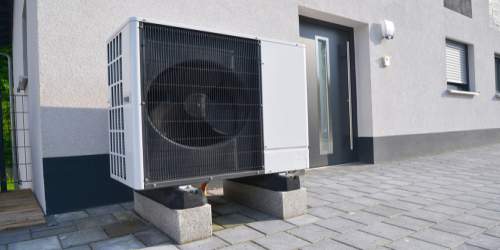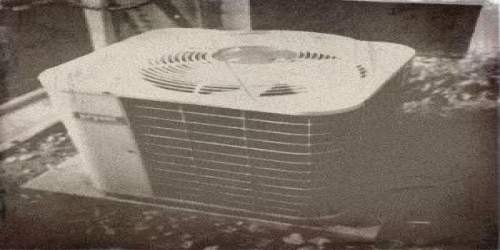Read Time : 4 Minutes
Air Source Heat Pump Reviews
Heat pumps are becoming increasingly popular as a way to heat, and in some cases cool our homes and workspaces without burning fossil fuels. Heat pumps are powered by electricity but rather than generating heat directly they move it from one location to another through a chemical process. Air source heat pumps could be a great investment for you, but it’s important to take a good look at other people’s experiences with the technology. Reading customer reviews and experiences should be an essential part of your research, these can be found on our installer profiles and simply by talking to your friends or neighbours. A good installation company should be able to refer you to some of their previous customers. Take some time to read the information on this page which should help you decide what issues may be pertinent to you.
How Does the Air Source Heat Pump Work?
An air source heat pump works by absorbing the heat from the air at a low temperature using a refridgerant. The liquid passes through a compressor which raises the temperature. Next, it transfers the now higher heat temperature to the heating and hot water circuits that are found throughout your home, your central heating system. However, when we take a closer look at the air source heat pump systems, there are two common types you'll come across.
Air to Water
This system works by taking advantage of your wet central heating system and distributing heated water through it. Most air to water heat pumps are designed to create a lower temperature than standard combustion boilers, which makes them a lot more suitable for use with things like underfloor heating and large radiators. They are designed to create an ambient temperature on an ongoing basis.
Air to Air
This system works to produce warm air that is then blown into a room or circulated by fans through ducts in order to keep warm a property. An outdoor unit contains a coil filled with a refridgerant that has a low boiling point, much like an air to water system. Cold air is blown over the refridgerant to causing it to evaporate and absorb the heat. This then becomes a low-pressure gas which is then drawn into a compressor which pressurises the refridgerant causing the temperature to rise significantly. The refridgerant is then drawn to an indoor unit which changes it back into a liquid and transfers the heat to indoor air, usually blown into the room using fans.
COMPARE PRICES FROM LOCAL INSTALLERS
Compare prices from local companies fast & free
Enter your postcode to compare quotes from leading professionals. We promise to keep your information Safe & Secure. Privacy Policy
The Benefits of an Air Source Heat Pump
- Lower fuel bills
- Benefit from the Government's Boiler Upgrade Scheme (BUS)
- Lower carbon emissions
- Can heat your home as well as providing your domestic hot water requirements.
- Minimal maintenance required
- Easier to install than other ground source heat pumps
Heat pumps work in contrast to conventional gas and oil boilers. This is because they deliver heat at a lower temperature over a much longer period of time. As a result, they may need to be running constantly during the winter months in order to effectively heat your home. It should also be noted that your radiators will not be as hot to touch when using a heat pump, unlike conventional methods such as gas and oil boilers.
Air Source Heat Pump Reviews
Some customers have found that the air source heat pumps can be quite noisy when compared to conventional heating methods. This said, the decibel rating of heat pumps has dropped significantly in recent years and many manufacturers now boast 'whisper quiet' systems. In the old days, the Renewable Energy Hub even had reports of heat pumps waking them up at night but that all stopped a while back. As long as the system is installed correctly, on the right central heating system and in a well-insulated property all reports are that they have been an excellent and efficient replacement for an old combustion boiler. Keeping the house at a good and consistent temperature. It's worth noting that heat pumps can take a while to fire up. Some feel that it is not suitable for replacing fossil fuel boilers due to this. It can be an inconvenience in the winter months or if you're not regularly at the property.
ASHP's are a great solution for families with water tanks who end up running out of hot water by the time the third person has a shower. The air source heat pump works to heat water up for you consistently, leaving no one without a hot shower. Families have found this very advantageous. This said, one of the main flaws people find with the system is that it cannot heat water and your home simultaneously. So, when you go to heat the water for your bath, the radiators will go cold and have to heat up again. Speak with your installation company about this as there are work-around solutions.
Many customers note that they have found the system very cost effective, and that the levels of heat distributed have been very consistent – especially when coupled with underfloor heating. It provides low levels of constant heat to keep your home at a comfortable temperature. Another of the great features customers have noted is the fact that it can still function below freezing, meaning that even in the heart of winter you can still stay warm in your home. They are also relatively easy to install and maintain, meaning that they aren’t a great deal of hassle to own and run.
ASHP systems have their pros and cons
Pros:
- Efficiency. ASHP systems are highly efficient. Using the chemical process described above they can generate between 2-4 times more heat energy than the electrical energy they consume.
- Running costs. Due to their high levels of efficiency, ASHP systems can save you money on your bills. Especially if switching from a standard electric boiler or an oil or LPG system.
- Carbon saving. They are environmentally friendly. By using renewable heat from outside the carbon consumption, after the carbon lifecycle is considered, is decided by the method in which your energy provider generates the electricity for your home.
- Cooling. ASHP systems are versatile, in most cases they can provide both heating and cooling.
- Safety. You don't need an oil or LPG tank which can leak or ignite and there's no combustion which reduces the safety concerns.
- Lifespan. Heat pumps have lower maintenance requirements and usually, longer lifespans. They should last 15 years or more.
- Zoning. They're usually installed with modern zoning systems which help to provide a cost-effective solution.
- Grants. Grants and subsidies. ASHP systems are key part of the government's plan to reach net zero. To this end they are providing the Boiler Upgrade Scheme grant and other grant systems to help with the upfront costs.
Cons:
- Upfront costs. Even with the Boiler Upgrade Scheme which is offering £7500 towards the cost of an air to water heat pump, the system can still cost more than a new gas boiler.
- Temperature. As the outdoor temperature drops, the coefficient of an ASHP will drop. If it gets very cold outside and the heat pump hasn't been sized correctly or the house isn't energy efficient an ASHP can struggle to effectively heat a property.
- Noise. ASHP's can be noisier than other boilers. Make sure you check the decibel rating of the model you're pitched. You can often ask to see the unit in action.
- Space requirements. Heat pumps require outdoor space. An air to water unit will sit against an external wall and uses about as much space as you'd need to lean a moped.
- Climate. When the temperature drops outside, the heat pumps efficiency will drop with it. When it's extremely cold, this can cause some problems. Most heat pumps will still provide a good level of heat down to -20C.
- Maintenance. As with all boilers, heat pumps do require maintenance. It has been said that heat pumps require less maintenance, but you will need a qualified heat pump engineer and the prices for specialists can be high.
- Aesthetics. Heat pumps are sizable and aren't exactly a thing of beauty. Make sure you're happy with the look of your selected heat pump, you'll be living with it for a long time.
Want to Know More?
Check out our 'Further Reading' articles on the right for more information. If you think you're ready to move forward then we have a directory of installation companies where you can browse through approved companies in your area. Or simply give us a call using the number at the top of this page. We're not selling you anything and always happy to help.
Find a local installer
Welcome to the biggest directory of UK renewable energy companies





 How does a Heat Pump Work
How does a Heat Pump Work








